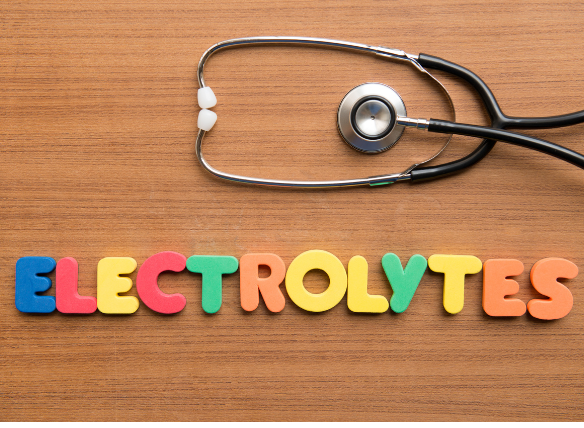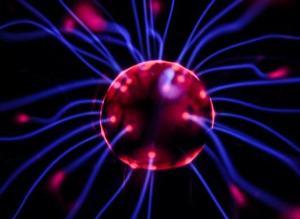Electrolytes: What role do they play in our body?
Published 5 Jul 2024 • By Candice Salomé
Electrolytes are minerals in the body that conduct electricity because they contain charged particles called ions. They can be found in both liquid and solid forms. In the human body, electrolytes are essential for making sure that important functions, like staying hydrated, work properly.
But what exactly are electrolytes? What is their function in our body? Where can they be found?
We tell you everything in our article!

What are electrolytes?
More than half of a person's body weight is made up of water. This water is compartmentalized into different spaces called fluid compartments. These three compartments are:
- The fluids inside the cells (intracellular fluid),
- The fluids in the space surrounding the cells (interstitial fluid),
- The blood (plasma).
For the body to function normally, it must prevent the fluid levels in these areas from varying too much. This is where electrolytes come into play.
Electrolytes are chemical components that dissociate into particles carrying an electrical charge (ions), either positive or negative, when dissolved in the body's fluids. These ions carry the electrical energy essential for performing several bodily functions.
Why are electrolytes essential?
Electrolytes are vital for several reasons:
- Maintaining hydration levels: The movement of sodium and potassium within and outside the cells determines how much water the body retains or expels, regulated by hormones such as antidiuretic hormone and aldosterone.
- Propagating electrical impulses: Electrical signals need to reach muscle cells to enable muscle contraction and relaxation, and they are crucial for nerve signal transmission.
- Supporting a healthy nervous system: They help maintain a healthy nervous system, mental health, and quality sleep.
- Balancing body fluids: The body needs enough electrolytes to regulate fluid balance, ensuring all vital processes.
- Maintaining acid-base balance: They help maintain the body's acid-base balance (pH), the equilibrium between acidity and alkalinity.
Electrolytes are not produced by the body; they must be obtained through daily nutrition.
What are the most important electrolytes?
The main electrolytes essential for proper body function are:
- Sodium: Regulates water and fluid balance in the body through the kidneys.
- Potassium: Contributes to the proper functioning of the nervous system and muscle building.
- Calcium: Essential for healthy bones, teeth, muscles, energy metabolism, blood clotting, and neurotransmitter release.
- Magnesium: Maintains electrolyte balance, involved in DNA and RNA synthesis, cell function, enzyme activity, muscle function, nerve impulses, sleep, and mood regulation.
- Chloride: Works with sodium to help maintain osmotic pressure, regulates material and fluid flow between cells, and is a component of stomach acid (hydrochloric acid) for digestion.
- Phosphorus: Supports energy metabolism, forms ATP (adenosine triphosphate), and aids protein production for cell growth and repair.
Thus, electrolytes influence many essential bodily mechanisms. The body needs sufficient amounts of these minerals to function properly. Deficiencies can lead to various health issues such as bone weakness, fatigue, or a weakened immune system.
What causes electrolyte imbalance?
The body's electrolyte balance is delicate and can be disrupted for various reasons, such as:
- Intense physical exercise leading to significant water loss (sweating) and sodium loss,
- High temperatures increasing sweating, resulting in water and sodium loss,
- Poor nutrient absorption. For example, poor digestion leads to poor absorption regardless of diet quality,
- Vomiting and diarrhoea can cause significant water and electrolyte loss,
- Kidney problems. When the kidneys do not function properly, water and electrolyte balance is compromised,
- Chronic diseases (e.g., heart failure) and certain endocrine disorders (e.g., adrenal insufficiency),
- Alcohol use,
- Certain medications, such as diuretics, promote water loss due to frequent urination.
Where are some natural sources of electrolytes?
A healthy and balanced daily diet is essential, as electrolytes are provided through it. Some foods are richer in electrolytes than others, including:
- Apricots,
- Peaches,
- Eggs,
- Peanuts,
- Almonds,
- Green vegetables (rich in magnesium),
- Poultry,
- Cheese,
- Milk (rich in calcium and phosphorus),
- Seafood,
- Raisins,
- Sunflower seeds,
- Table salt.
Key takeaways
Electrolytes are essential for the proper functioning of many mechanisms in the human body, such as maintaining hydration levels, supporting a healthy nervous system and mental health, and ensuring the proper functioning of bones, teeth, and muscles. They are not produced by the body and are primarily obtained through diet and proper hydration. Electrolyte deficiencies can lead to numerous health problems. Feel free to discuss this with your doctor!
Did you find this article helpful?
Give it a "Like" and share your thoughts and questions with the community in the comments below!
Take care!
1 comment
You will also like

The Hypotoxic (Seignalet) diet: Is it effective for certain chronic illnesses?
23 Jul 2021 • 6 comments

 Facebook
Facebook Twitter
Twitter


